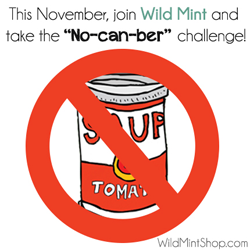By Hannah Helsabeck, Wild Mint
With Halloween decorations down and costumes boxed up for next year, it’s time to pawn off that extra candy to make room for all those comfort foods that make November so delicious! And I don’t know if you agree, but as soon as October is over, all I can think about is pumpkin everything, homemade cranberry sauce, casseroles, and, unfortunately, the array of canned goods advertised in grocery stores everywhere.
Canned goods are often seen as a convenient way to whip up holiday meals, but often overlooked are the potential toxic chemicals that could be lurking in those cans, contaminating the food, and negatively affecting people’s health.
So, for the second year in a row, our team at Wild Mint is hosting a “No-Can-Ber” challenge to help shed light on a healthier way to spend the month, hoping to inspire others to make a positive change in the kitchen!
Will you join us?
The inspiration behind the “No-can-ber” challenge came in 2012 when my family made a New Year’s resolution to avoid canned foods. This goal was not only attainable (unlike how most New Year’s resolutions end up) but would also allow us to experiment with more healthy recipes and avoid exposure to the toxic chemical BPA, found in most canned food lining (learn more here).
After 10 successful months of eating can-free and realizing how easy (and fun!) it is, we wanted to share our experience with others. That November (when many people turn to canned food recipes), we announced our first “No-can-ber” challenge and shared can-free recipes from our own kitchen and the kitchen’s of our loyal fans throughout the month!
Our goal with “No-Can-Ber” is to highlight the invaluable health benefits of going totally can-free with meals. While fresh and frozen foods also provide more nutrients than canned and processed ones, we wanted people to know that there is also another, powerful reason to go can-free: bisphenol-A (or BPA).
The chemical BPA, which can leach into people’s food or drink and disrupt hormones in the body, is present in the epoxy lining of many metal food cans. And although BPA is found in various other sources in the environment (including in certain types of plastic items and cash register receipts), a new study by the Breast Cancer Fund shows canned food as a major route to human BPA exposure.
Perhaps the most startling information presented by the Breast Cancer Fund report is the affect BPA exposure can have on a fetus within the first 11 weeks of a woman’s pregnancy (around the time many women are just finding out they are pregnant).
During this time period, a fetus exposed to BPA in their mother’s womb can suffer developmental damage that may not show up for years, or even decades, later. Since fetal development is especially sensitive to fluctuations of estrogen and estrogen-like compounds like BPA, the chemical could spark changes in the fetus that may lead to disease in adulthood.
If you want to join our “No-Can-Ber” Challenge, visit our Challenge Page and leave comment at the bottom to let us know!




